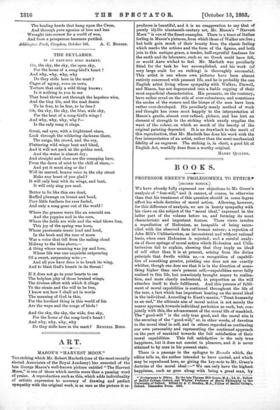ART.
MASON'S "HARVEST MOON."
TUE etching which Mr. Robert Macbeth (one of the most recently elected Associates of the Royal Academy) has executed of the late George Mason's well-known picture entitled "The Harvest Moon," is one of those which merits more than a passing word of praise. A reproduction such as this, which adds individuality of artistic expression to accuracy of drawing and perfect sympathy with the original work, is as rare as the picture it re-
produces is beautiful, and it is no exaggeration to say that of purely idyllic nineteenth-century art, Mr. Mason's "Harvest Moon" is one of the finest examples. There is a trace of Italian feeling in Mason's pictures, from which those of Walker are free ; but both gain much of their beauty from the classic feeling which marks the actions and the form of the figures, and both join to this antique grace, a tender, half.regretful fondness for the earth and its labourers, such as no Greek could have felt, or would lave wished to feel. Mr. Macbeth was peculiarly fitted for the task he has accomplished, and his work (of very large scale for an etching) is thoroughly successful_ This artist is one whose own pictures have been almost entirely concerned with peasant life, and he is probably the one English artist living whose sympathy with Walker, Pinwell, and Mason, has not degenerated into a feeble copying of their most superficial characteristics. His peasants, on the contrary,. have rather erred on the side of over-robustness, and sometimes the ancles of the women and the biceps of the men have been. rather over-developed. His peculiarly manly method of work and thought has come most happily to the interpretation of Mason's gentle, almost over-refined, picture, and has lent an element of strength to the etching which nearly supplies the- want of the colour, on which so much of the beauty of the original painting depended. It is no drawback to the merit of this reproduction, that Mr. Macbeth has done his work with the free interpretation of an artist, rather than the semi-mechanical fidelity of an engraver. The etching is, in short, a good bit of English Art, worthily done from a worthy original.
HARRY QUILTER.


































 Previous page
Previous page